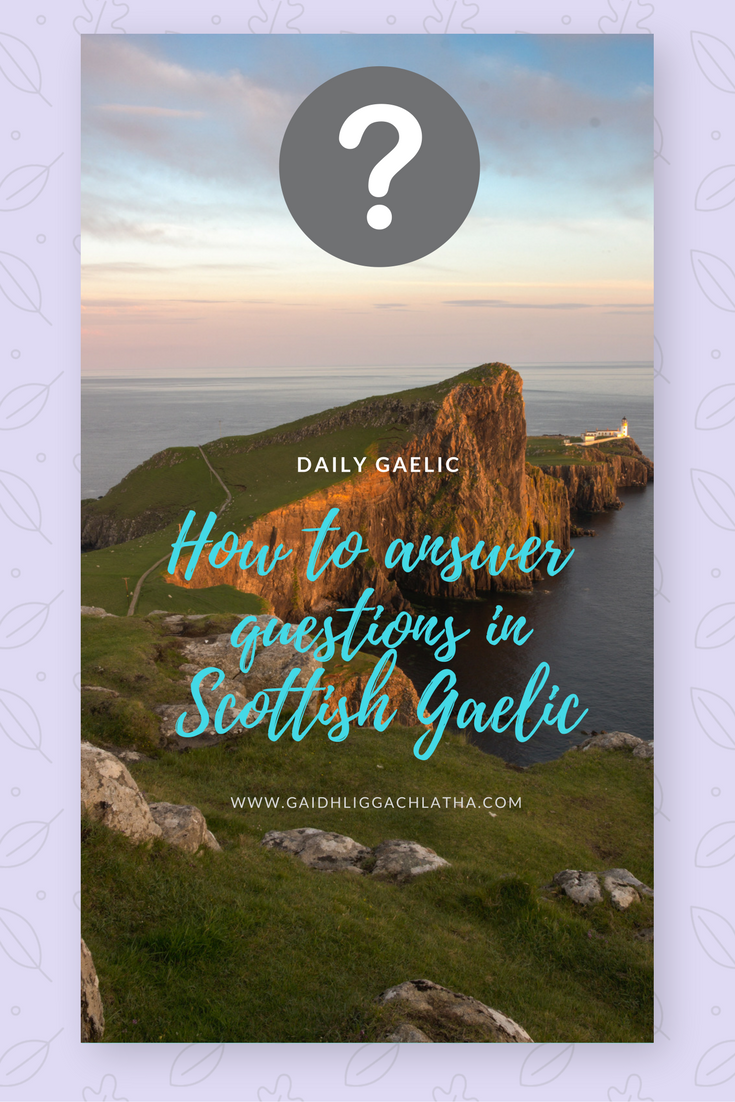|
Gaelic has no words for 'yes' or 'no'.
Coming from English, where we rely on yes and no for a lot of our conversation (especially 'no' if you are around toddlers) this sounds a bit alien. How can you get by with no 'yes' and 'no'? Here is a quick look at how it works.
The quick answer is that you answer questions by using the positive statement form for yes and the negative statement form for no.
However there are a few different ways this can look: There are several different sentence types in Gaelic. Let's look at the two most common: 1. Someone is/was/will be somethinging and 2. someone somethinged or will something. The first type of sentence is one that has the -ing form of the verb (aka. verbal noun or present participle). For example "I am running" or "She was taking to him" or "We will be going on vacation on Tuesday." In Gaelic these types of sentences are made like this: The verb 'to be', subject (noun or pronoun), -ing form of the verb. Examples: Tha mi ag obair. = I am working. Bha iad ag òl tì. = They were drinking tea. Bidh sinn a' dannsa. = We will be dancing. Because the verb 'to be' is the main verb, all questions will be answered with that verb. Here is what it looks like. A bheil? ---> yes = tha no= chan eil An robh? ---> yes = bha no= cha robh Am bi? -----> yes = bidh no= cha bhi The second type of sentence is one in which there is no verb 'to be'. For example: I walked. They ate. You said.... In this case: yes= the positive statement form of the verb in the tense the question was asked in. no= the negative statement form of the verb in the tense the question was asked in. Examples: An do dh'òl thu an tì? (did you drink the tea?) yes = Dh' òl no= Cha do dh' òl. An cuir thu e air a' bhord? (will you put it on the table?) yes = cuiridh. no = Cha chuir. As you can see this means that there is a different word for 'yes' and 'no' for every different verb in this type of sentence. The key is to listen to the first part of the sentence to see what verb is being used.
4 Comments
Bee
12/7/2022 09:25:05 am
I just cannot get to grips with all the ways to say yes and no. This hasn't covered the questions the questions I have. Like an gabh? An Ann? An ith? An do fhreagair? Ect
Reply
Tonya
2/17/2020 06:23:47 am
Yes, it is a bit confusing at first. I try to write out the positive and negative statements for each question, using the info provided. Then, I go back and highlight the verbs of each sentence. This helps a lot!
Reply
Thanks very nThanks very nice!
Reply
Leave a Reply. |
Details
AuthorsCaroline has been involved with Gaelic for more than 18 years. She has degrees in Celtic Studies and Gaelic Medium Teaching. Archives
March 2021
Categories
All
|
Proudly powered by Weebly


 RSS Feed
RSS Feed